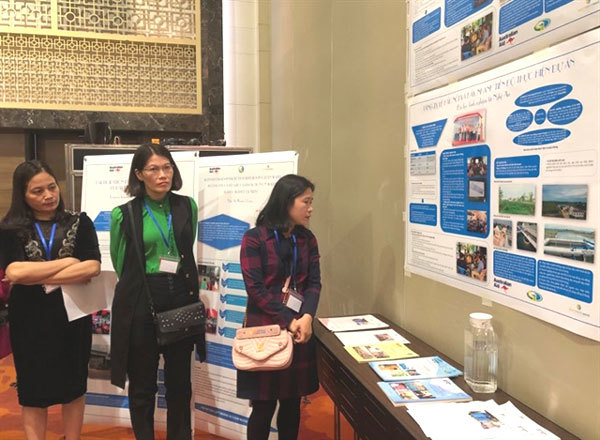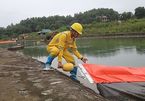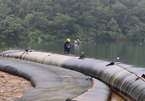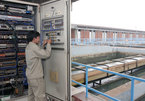 |
| A PSI project model implemented in Phu Thanh Commune, Nghe An Province is displayed at a conference in Hanoi. VNS Photo |
That was the message delivered by Nguyen Thi Hong Khanh, from the Ministry of Construction’s Technological Infrastructure Department.
She believes a solid legal framework is necessary to make sure there is plenty of water for future generations.
“We need a scheme for the Water Supply Law, and submit it to the Government and the National Assembly,” Khanh said.
“It is needed to survey and catalogue important sources to have an effective protection, exploitation and use plan.”
There are more than 200 water supply enterprises, mainly operating as joint stock companies.
The national programme to ensure water supply and prevent water loss in the 2018-25 period has been implemented to promote investment and improve modern and energy-saving water treatment technology. It also establishes criteria for evaluating a safe water supply work.
At a recent conference hosted by the Ministry of Agriculture and Rural Development’s Directorate of Water Resources and East Meets West Foundation in Hanoi, a representative from the Directorate of Water Resources said since 2013, many provinces have actively enacted policies to call on the private economic sector in rural clean water supply works.
While piped water supply systems have increased in rural areas, more than 30 per cent of community managed and public water works are out of service.
According to a Directorate of Water Resources’ latest report, most of the rural water supply works in northern Thái Bình Province have been transferred to the enterprise for management.
In northern Bac Giang Province, 12 local enterprises have built and are managing water plants that supply clean water to about 124,000 people.
In northern Ha Nam Province, from two in 2013, now there are 11 enterprises built and managing rural water supply works serving 150,000 people.
In the Mekong Delta province of Tien Giang, there are 15 enterprises invested for water supply system with 13 among total 29 provincial plants managed by local companies.
However, the representative said: “The rural population is sparse while the acreage is large. Many areas are developing so constructing water supply works requires high cost but economic efficiency is low. Investors must consider before joining.
“We lack of capital mobilising measures. Many provinces have had supportive policies but not enough financial resources to support the private sector.”
The conference reviewed the Innovations for Private Sector Development Project (PSI), funded by the Australian Department of Foreign Affair and Trade (DFAT), that has carried out in three nations: Vietnam, Laos and Cambodia.
In Vietnam, the AU$2 million-funded PSI started in 2016 has succeeded in providing new piped water works for more than 6,600 rural households. The project has co-ordinated with eight private investors.
Its first phase, lasting 20 months, with four private companies, two in northern mountainous Son La Province and two in northern Ha Nam Province built plants to supply 3,610 households.
The second phase, from May 2017 to September 2019, provided clean water to 2,990 households in two provinces of An Giang and Nghe An.
Participating in the project in Nghe An Province’s Phu Thanh Commune, Le Thi Kim Chung, from provincial Women’s Union said local authorities have focused on disseminating clean water to people.
PSI-invested water supply work in Phu Thanh Commune has help 1,630 households access to clean water.
“We organise many community-based meetings to introduce and provide full information on the project, explaining about clean water’s importance for health.” — VNS

Hanoi to hire consultant for clean water pricing
The independent consultant will assess the quality of water intake and calculate production costs of waterworks.

Hanoi strengthens water testing after Da River pollution crisis
The chairman of Hanoi People's Committee, Nguyen Duc Chung, has directed city’s Health Department to test multiple water samples every day and report to city leaders and publicise the results to local citizens.

HCM City takes measures to ensure tap water quality
The quality of tap water in HCM City is being closely monitored by production and distribution units as well as independent agencies such as the main Preventive Medicine Centre and district-level preventive health centres.
 Tighter regulations are needed to ensure good quality water is sourced for years to come.
Tighter regulations are needed to ensure good quality water is sourced for years to come.